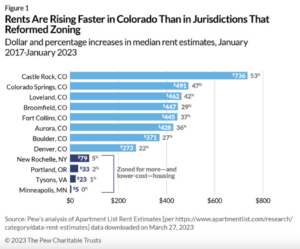As the Colorado legislature considers legislation to update zoning and land use regulations to allow for more housing, a new analysis by The Pew Charitable Trusts found that rigid zoning and strict land use policies have contributed to a 31% rise in Colorado rent prices between January 2017 and January 2023.
Many jurisdictions throughout Colorado only allow single-unit detached housing to be built on most land, causing rents to rise much faster than in places that have zoned to allow more housing. In the analysis, Pew notes:
- Colorado’s population grew 14.8% between 2010 and 2020 but the state increased its housing stock by only 12.6%.
- More flexible zoning policies in the Houston area have allowed the region to grant permits for an average of 86 new homes per 10,000 people annually from 2017-21, while the Denver area permitted only 77 per 10,000 people. As of January, Denver’s rents were 31% higher than Houston’s.
- The Denver area’s 2022 homelessness rate of 21 unhoused people per 10,000 residents is four times higher than the Houston area’s and three times higher than the Pittsburgh area’s.
- The jurisdictions that have kept both housing costs and homelessness levels low tend to have enough housing, especially lower-cost forms of housing.

Pew previously found that new zoning rules in four jurisdictions—Minneapolis, MN; New Rochelle, New York; Portland, Oregon; and Tysons, Virginia— allowed cities to increase the number of homes and keep rent growth low, indicating their zoning reforms improved affordability.
Founded in 1948, The Pew Charitable Trusts uses data to make a difference. Pew addresses the challenges of a changing world by illuminating issues, creating common ground, and advancing ambitious projects that lead to tangible progress.
CLICK HERE to read the full article.









